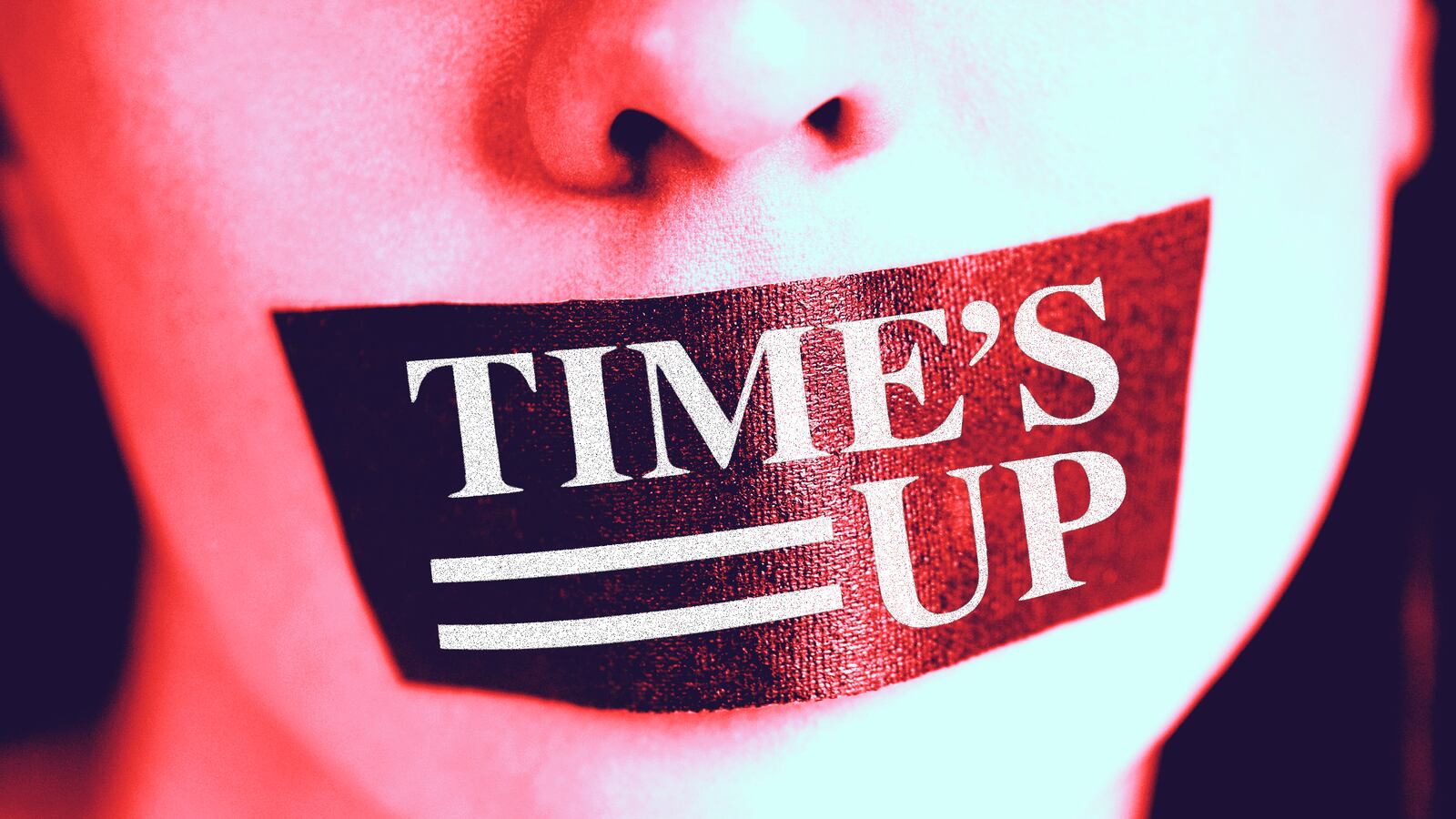Earlier this month, in the midst of a public relations nightmare, the nation’s top anti-sexual harassment advocacy group took a step that appeared to fly in the face of its principles. Time’s Up, the organization formed by Hollywood power players in response to the MeToo movement, asked volunteers to sign on to an agreement limiting their ability to speak freely about the organization—including a pledge not to disparage the group, its employees, or its “community members.”
The Daily Beast obtained a copy of the document that was presented to members of at least one committee earlier this month, shortly after members of the group’s health-care subsidiary quit en masse.
Monica McLemore, a founding member of the health-care group and former adviser to the Time’s Up global leadership board, called the document “surprising and disappointing.”
“I can’t believe an organization that has railed against actresses having to sign non-disclosure agreements would then turn around and ask people who were affiliated with the organization ... to sign away their capacity to be critical,” she said. “It does not sit right with me.”
“To ask someone to sign a statement agreeing not to disparage the organization, to me it smells of the same tactics we were trying to end,” she added.
A source familiar with the matter said the agreement was first circulated late last year, and that volunteers were not prohibited from attending committee meetings if they did not sign it. A spokesperson for Time’s Up said the agreement was “intended solely to protect survivors, not to silence anyone.”
“The document, which was drafted and circulated last year, has one purpose and one purpose only—to make sure that survivors who speak up during TIME’S UP meetings are entitled to confidentiality, so that they can tell their stories in a safe space and not worry that what they say will be repeated by others without their consent,” she said in a statement.
The agreement, the existence of which was previously reported by The Hollywood Reporter, requires volunteers to sign onto 11 “guiding policies,” including that they will not “disparage TIME’S UP, its employees or its community members.” Members must also agree to “keep all non-public information about TIME’S UP’s activities and its community members confidential” and “not disclose, use, or publish any of TIME’S UP’s confidential and/or privileged information without approval.”
Employment lawyers who spoke to The Daily Beast said the language was standard to many employment contracts, but could be used to discourage survivors of harassment and discrimination from speaking negatively about their experience. Other survivor advocacy organizations include specific carve-outs in their confidentiality agreements stating that they are not meant to prohibit parties from discussing workplace harassment or discrimination.
Douglas Wigdor, an attorney who has represented multiple victims of harassment bound by NDAs in recent years, said the non-disparagement clause was the most concerning part of the agreement.
“I am genuinely surprised that Times Up, an organization that encourages victims to speak up rather than suffer in silence, would require its own workers to sign a non-disparagement agreement,” he said. “This, along with one of its founders advocating mandatory arbitration, seem to run counter to its otherwise laudable mission.”
A cornerstone of Time’s Up’s work in recent years has been calling on companies to release victims of sexual harassment from any non-disclosure agreements signed as part of a settlement or a condition of their employment. The group called on NBC to release employees from their NDAs during an internal investigation of the company’s workplace culture, and pressured Fox News to release Gretchen Carlson from a similar agreement.
A policy memo on the group’s website highlights the 13 states that have so far banned mandatory non-disclosure agreements, calling it “a step forward in making sure everyone is safe when they go to work.” Another page on the site encourages supporters to text the NFL to ask the Washington Football Team to release workers from their NDAs.
Last year, the group issued a press release praising Bloomberg LP and Conde Nast for ending the use of NDAs and releasing employees from any existing agreements in cases of sexual harassment and discrimination.
“For far too long, mandatory NDAs have meant that workplace harassment remains hidden—silencing those who experience sexual harassment and enabling abusers to evade discovery and avoid consequences,” CEO Tina Tchen said at the time. “Sexual harassment takes away the voice and agency of an individual employee—and mandatory NDAs have perpetuated this stark power imbalance.”
Earlier this month, the group attracted criticism from members of Time’s Up Healthcare—its subsidiary tackling harassment and discrimination in the medical setting—over a lawsuit that accused one of its founding members of brushing off a workplace sexual harassment complaint. Members told The Daily Beast they felt their suggestions on how to handle the situation were railroaded by Time’s Up leadership. About a third of the 50-member organization ultimately stepped down.
One former member told The Daily Beast the non-disparagement agreement was an example of the group’s “extreme hypocrisy.”
“It's an organization full of volunteers, who are mostly survivors, so really, they are forcing survivors to sign NDAs,” she said. “What makes them any different than the people they claim to be protecting survivors from?”
“This is why so many of us left,” she added. “We realized they were not just not doing enough, they were actually becoming the very thing we were trying to change.”
The group has also attracted scrutiny for Board Chair Roberta Kaplan’s role in a case against financial giant Goldman Sachs. Kaplan, who has also represented survivors such as E. Jean Carroll and Amber Heard, signed on to represent the bank late last year against accusations that its general counsel covered up sexual misconduct claims. Last month, Kaplan and her co-counsel successfully moved the case out of court and into confidential arbitration—a process many advocates have decried as silencing survivors.
Wigdor and his business partner David Gottlieb represented the plaintiff in that case, and took aim at Kaplan in a statement last year.
“Forcing victims of discrimination and harassment to arbitrate claims in a secretive forum is wrong. Period,” the attorneys said. “Ms. Kaplan surely knows this as co-founder of the Time’s Up Legal Defense Fund, which is why it is so disappointing that she would agree to take such an anti-#MeToo position on Goldman’s behalf.”



